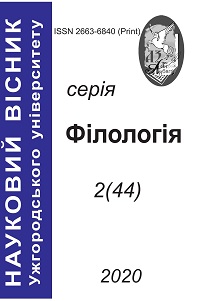EVALUATION AS A COMPONENT OF PHRASEOLOGICAL MEANING IN ENGLISH
DOI:
https://doi.org/10.24144/2663-6840.2020.2.(44).338-342Ключові слова:
phraseologicalunit, evaluation, positively marked PU, negatively marked PU, axiologically simple PU, axiologically complex PU.Анотація
The article is devoted to the study of a special layer of English phraseology, namely axiologically marked phraseological units as an important means of expression of evaluation in the English language picture of the world. The paper deals with the structure of evaluation as a component in the structure of phraseological meaning, the principles of differentiation of axiologically neutral and axiologically marked PUs, axiological characteristics of phraseological units and peculiarities of their lexicographical representation, as well as types of axiologically marked PUs. As a result of the research, the author comes to the conclusion that the phraseologisms are complex semantic formations dominated by connotative semes, i.e. most of them are axiologically marked.
The analysis of axiologically marked PUs in modern English has shown that in such units, evaluation is inextricably linked with expressiveness and emotionality – the expression of an emotional attitude, either positive (approval, encourage- ment, praise, admiration, etc.) or negative (disapproval, condemnation, neglect, contempt, judgment). Axiologically marked PUs have a special illocutive and perlocutive potential, promote the development of communicative interaction, express and form interpersonal relationships, provide for appropriate responses etc. It has been found that phraseological units can express the evaluative meaning explicitly and implicitly. Phraseological units expressing axiological meaning explicitly fall into classes, among which axiologically simple and axiologically complex phraseological units are distinguished. It has been determined that evaluative PUs qualify different aspects of human life and spheres of activity.The evaluative meanings contained in PUs, to a certain extent, construct fragments of the axiological picture of human life and social relations. The formation of phrase- ologisms is based on some stereotypical life situations. The analysis of English axiologically-marked phraseological units has allowed revealing evaluative attitude of native speakers to subjects, actions, phenomena of extra-linguistic reality, as well as human behavior and state, embedded in the structure of phraseological meaning.

